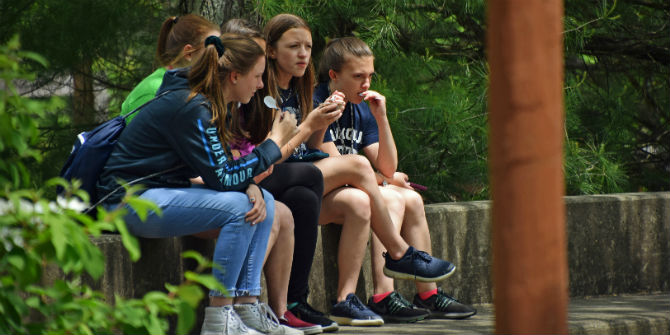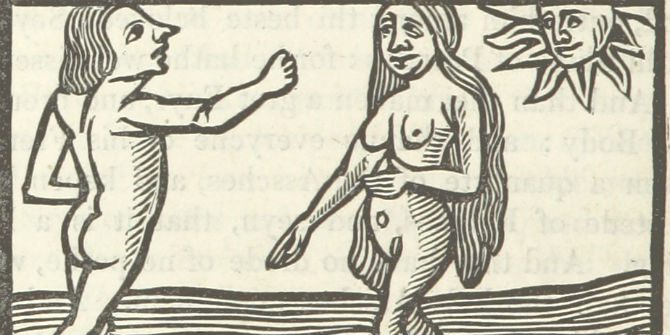 In a time of agitation and uncertainty, an increasingly overt hostility towards EU migrants in the UK has become part of the public and political discourse surrounding the debate over Brexit. Sara Young (UCL Institute of Education), who researches the experiences of Polish adolescents, shows how a group of Polish-born youngsters is challenging such vitriol and asserting their right to be in the UK.
In a time of agitation and uncertainty, an increasingly overt hostility towards EU migrants in the UK has become part of the public and political discourse surrounding the debate over Brexit. Sara Young (UCL Institute of Education), who researches the experiences of Polish adolescents, shows how a group of Polish-born youngsters is challenging such vitriol and asserting their right to be in the UK.
Economic Polish migration to the UK following the accession of Poland to the European Union in 2004 has become the subject of increasing hostility. Where Poles were initially seen as a welcome addition to the workforce, following the economic crisis of 2008 this view was replaced by accusations in public and political discourse that they were not only stealing British jobs, but also coming to the UK to exploit the social security system. Such attitudes have become so widespread that similar views have even been expressed by school students. Given the prevalence of such beliefs, how is it possible for Polish-born youngsters, who came to the UK with their parents and have little say either in the migration process or in the way Poles are presented, confront such ugly stereotypes?

In a doctoral study I conducted just before the June 2016 referendum, I spoke to a group of Polish-born adolescents who had immigrated to the UK with their parents. The research was conducted in two semi-rural towns in England with small Polish communities. Neither town was a Brexit stronghold: in the referendum, one location voted Leave by a slim margin of 50.5%, while the other had a Remain majority of 55%. Notwithstanding, the majority of the youngsters in my study had all experienced some form of anti-Polish abuse. This ranged from bullying at school, to repeated questioning by their neighbours as to why they had come to the UK. Yet the adolescents’ accounts of their reaction to such overt hostility were not stories of victimhood. Rather, these young people attempted to present themselves as agentive, and to assert their right as Poles to be in the UK.
One way of resisting was through explanation. One sixteen-year-old recounted how he and another Polish student had been subjected to a barrage of hostility by classmates following a GCSE Geography lesson focusing on migration from Eastern Europe. He explained that, in response to accusations of ‘stealing jobs’, the two boys wanted others ‘to know, [to] try and tell them the facts, like this is wrong, and like the truth about it!’ They described how the situation in Poland was precarious, that it was impossible to establish decent living conditions there and this was why their families had chosen to move. This attempt to establish ‘the facts’ was echoed by a 15-year-old girl, whose neighbours were ‘always asking us why we moved here’. She attempted to counter such repeated questioning with the response that ‘in Poland we’ve got big unemployment’.
She also felt that it was easier for Poles to find work, ‘because they are really hard-working people’. This familiar trope was another way of resisting negative stereotypes that I found to be common amongst the adolescents. The youngsters also attempted to reposition their parents professionally so they no longer adhered to the stereotype of Poles as manual workers. Hence one girl described her father as an ‘electrician’, and not a ‘builder’, following disparaging comments from girls at her school. Similarly, she presented her mother as a ‘beautician’, since she did nails privately, rather than focusing on her job in a small local factory. By recasting their parents’ professional standing in this way, these young people are thus shown to be resisting the narrow professional identity which is commonly ascribed to Poles in the UK.
The adolescents also spoke about their own future: they planned to stay in the UK, and were working hard at their GSCEs in order to achieve jobs ranging from working for computer companies, as an interpreter, or studying sports science. This applied even to those adolescents who spoke of the direct abuse they had received on arrival: these youngsters constantly reasserted their right to be in the country, and were adamant in their refusal to be driven out by the hostility they had encountered. One 14-year-old, who had been in the UK for 18 months, and subjected to physical bullying, insisted that regardless of any attempt to intimidate him, he was staying in the UK, where he intended to fulfill his ambition to become a vet. Far from ‘stealing jobs’, these adolescents are instead demonstrating how they are studying hard for their future careers, and are in no sense aiming to live off the state. Emphasising such professional ambitions also serves to validate the adolescents’ sense of their right to be in the UK, and sets out the way in which they may be seen to contribute to British society.
Through their narratives, these adolescents show a quiet determination to forge their own paths. Given the current toxicity unleashed by the Brexit debate, these youngsters’ stories of resistance serve as a firm riposte to those who seek to inflame the rhetoric of hostility, and provide a measured response to such hysteria.
This post represents the views of the author and not those of the Brexit blog, nor LSE.
Sara Young is a Postgraduate Tutor and Honorary Research Associate at the UCL Institute of Education. Her work examines the relationship between language and identity, and focuses on the experiences of Polish-speaking adolescents living in the UK.
Contact: sara.young (at) ucl.ac.uk







Let’s be clear because this article tends to gloss over it.
Leave voters who I know have no problem with migrants who are in this country the debate is and should be about the future rate of migration.